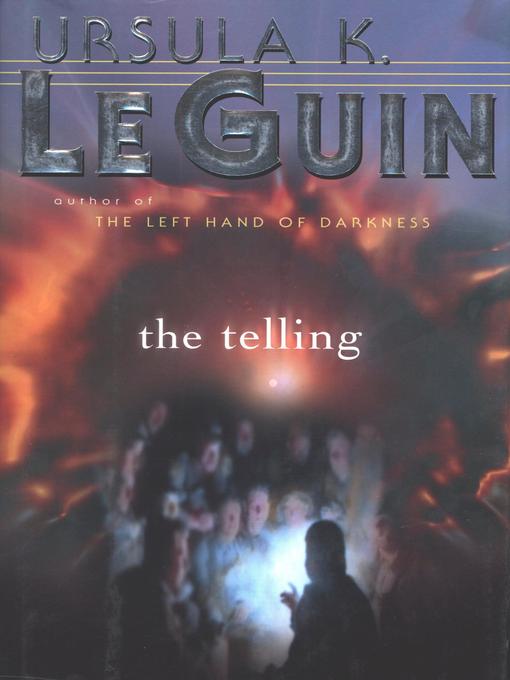
The Telling
Hainish Cycle, Book 7
فرمت کتاب
ebook
تاریخ انتشار
2000
Reading Level
5
ATOS
6.4
Interest Level
9-12(UG)
نویسنده
Ursula K. Le Guinناشر
HMH Booksشابک
9780547545622
کتاب های مرتبط
- اطلاعات
- نقد و بررسی
- دیدگاه کاربران
نقد و بررسی

Starred review from September 4, 2000
In this virtually flawless new tale set in her Hainish universe, Le Guin (The Left Hand of Darkness; Four Ways to Forgiveness) sends a young woman from Earth on her first mission, to the planet Aka as an Observer for the Ekumen. Although well prepared for her role, Sutty has been horribly scarred by her past. She grew up gay in a North America badly damaged by ecological stupidity and the excesses of a fundamentalist state religion called Unism. Traveling to Aka, she expected (and had been trained) to deal with a peaceful, essentially static culture based on an ancient, all-encompassing belief system akin to Taoism and known as the Telling. When she arrived, however, she discovered that during the decades it took her to reach the planet, Aka's culture has been radically transformed. The Telling has been all but banned, replaced by a soulless form of corporate communism. It becomes Sutty's task to take a harrowing journey into the high mountains, searching for the last, priceless depository of Akan traditional culture before it can be destroyed. As Le Guin notes in her preface, similarities to China during the Great Leap Forward are not entirely coincidental. Although this is a political and philosophical novel of the purest sort, it is anything but dry. With an anthropologist's eye, Le Guin develops her Akan culture in great detail, as she does her characters. Sutty is an entirely successful viewpoint character, a quirky mixture of competence and intense emotion. The Monitor, her primary nemesis on Aka, is nearly as compelling. This is a novel that aficionados of morally serious SF won't want to miss. (Sept.) FYI: Le Guin is the winner of several Nebula and Hugo awards for outstanding SF, as well as of a National Book Award, a Pushcart Prize, a Newbery Honor and the World Fantasy Award for Life Achievement.

Starred review from July 1, 2000
As a member of the Ekumen's embassy on the planet Aka, Sutty undertakes a delicate mission that leads her to a mountain village reported to contain the last remnants of a dying culture. Following a trail of subtle clues concealed in stories and folk sayings, Sutty discovers the suppressed history of a planet willing to abandon its old ways in the name of progress. Le Guin's latest addition to her "Hainish" cycle (e.g., Rocannon's World) continues her exploration of human culture and society through the filter of the far future. (Le Guin was inspired by Chairman Mao's brutal suppression of Taoism in China.) This parable of the modern world's headlong rush toward monocultural sterility exemplifies the author's elegant simplicity and keen insight. A priority purchase for libraries.
Copyright 2000 Library Journal, LLC Used with permission.

June 1, 2000
Le Guin has long been a master of literary science fiction that is both thoughtful and thought-provoking. This novel in her Hainish cycle, which includes "The Word for World Is Forest" (1976), "The Left Hand of Darkness" (1997), and "The Dispossessed" (1999), is no exception. The protagonist is the introspective Sutty, who grew up on Earth during the time of social unrest under the Unists, who insisted on one God, one Truth, one Earth--until the Ekumen, the League of All Worlds, ended their rule. Now trained as a linguist and in literature, Sutty is on the planet Aka, in the "information-restricted, controlled environment" of Dovza City, whose society strongly resembles that during the Cultural Revolution in China. There as an official Observer of Aka's cultural past, before it received technological knowledge from the Ekumen, she is totally frustrated, until she is allowed to go upriver to the small town of Okzat-Ozkat, where she finds the old way is still practiced in secret. However, was it a religion, a system, a philosophy, or what? She ends up calling it the Telling because of the storytelling, the handing down of descriptions of a place, an act or event, or a person, all interconnected, all affecting daily life, with a spiritual dimension that precluded religion as an institution. Aka and its society, past and present, are impressively visualized, as are Sutty's internalization and slow grasp of what she is seeking. The narrative is easy to read but not quickly read, because it invites constant re-reading in order to ponder the philosophical, political, and personal points Le Guin, despite her faraway setting, is making about life in the twentieth century on Earth. ((Reviewed June 1 & 15, 2000))(Reprinted with permission of Booklist, copyright 2000, American Library Association.)

























دیدگاه کاربران